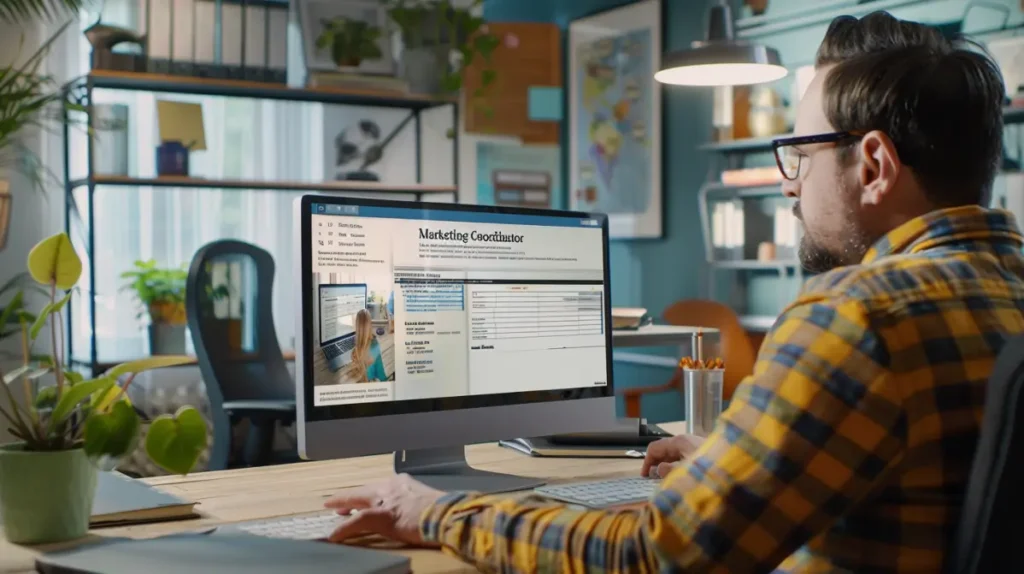Introduction

In the bustling heart of modern business, the role of a marketing coordinator emerges as both essential and transformative, serving as the linchpin in crafting compelling marketing narratives across industries. This dynamic position blends creativity with analytical prowess, making it indispensable in both sprawling corporations and nimble startups. Here, strategy meets execution head-on, as marketing coordinators deftly navigate through the ever-evolving digital landscape to propel their companies to the forefront of consumer consciousness.
Employers seeking the optimal foundation for crafting precise and effective hiring specifications need look no further. By following the link below, you can access our complimentary job description template for a Marketing Coordinator. This document, meticulously designed to incorporate the fundamental principles and best practices of C9Staff’s renowned hiring methodology, offers a robust template that ensures you attract top talent perfectly aligned with your organizational needs. Click below to download the ultimate job description template and elevate your recruitment strategy to the next level.
Marketing Coordinator Job Description

Unlocking the Role: What a Marketing Coordinator Really Does & Their True Value
Understanding the Marketing Coordinator Role

At the core, the responsibilities of a marketing coordinator involve the planning, execution, and tracking of marketing campaigns. Daily, this might include drafting press releases, coordinating email marketing efforts, managing social media accounts, and analyzing the performance of various marketing strategies. These tasks require a keen eye for detail and an ability to react to evolving market trends swiftly.
A typical day might also see the marketing coordinator liaising with the sales team to synchronize marketing strategies with sales initiatives, ensuring that each marketing campaign is tailored to support sales targets. This integration is crucial as it helps maximize the impact of each campaign, contributing to the overall growth and profitability of the company.
Strategic Significance of the Role
Beyond the daily tasks, the strategic significance of the marketing coordinator’s role within a business cannot be overstated. By managing the various strands of marketing efforts, the coordinator ensures that the company presents a unified message to its audience. This unity is essential for building brand consistency, which in turn, strengthens brand recognition and customer loyalty.
The marketing coordinator also plays a pivotal role in understanding and responding to customer feedback, market conditions, and competitor actions. This information is vital for adjusting strategies in real-time and for future planning. By feeding these insights back into the organization, the marketing coordinator helps shape the company’s strategic decisions, aligning marketing strategies with long-term business goals.
Integration Across the Organization
The role of a marketing coordinator does not exist in isolation. It is deeply integrated across the organizational structure, often requiring collaboration with the product development, customer service, and logistics departments. This cross-departmental interaction ensures that marketing strategies are not only feasible but also optimized for each aspect of the business.
For example, coordination with the product development team can provide valuable insights into product features that can be highlighted in marketing campaigns. Similarly, working closely with customer service can help refine customer personas and tailor marketing efforts to better meet the needs and preferences of the target audience.
Marketing Coordinator Mastery: Advanced Practices & Principles for Career Success
Essential Skills and Qualifications

Commencing on a journey as a marketing coordinator requires a diverse set of skills that blend technology, creativity, and strategic thinking. In this comprehensive guide, we’ll break down the essential skills you need, paired with real-world applications and the tools that can elevate your proficiency to the next level.
Core Skills for a Marketing Coordinator
- Digital Marketing: Mastery of digital marketing involves understanding various online platforms and tools. From SEO to pay-per-click (PPC) advertising, digital marketing coordinators leverage platforms like Google Ads and SEMrush to analyze traffic data and optimize marketing campaigns. Real-world application could involve using these tools to increase website visibility and drive conversions.
- Analytics: Analytics is crucial for measuring the effectiveness of marketing campaigns. Using tools like Google Analytics and Tableau, a marketing coordinator can track user behavior, campaign performance, and ROI. For instance, analyzing website traffic data to refine the targeting of digital ads.
- Project Management: Effective project management ensures that marketing initiatives are delivered on time and within budget. Tools like Trello or Asana can help coordinate tasks across teams, streamline communication, and monitor project timelines. For example, managing a product launch campaign involves scheduling tasks, assigning roles, and ensuring timely delivery of marketing materials.
Educational Background
Typically, marketing coordinators hold a bachelor’s degree in marketing, communications, or business. However, the landscape of education is evolving with more professionals turning to specialized online courses and certifications in areas like digital marketing and data analytics from platforms such as Coursera, HubSpot Academy, or Google’s Digital Garage.
Professional Certifications
Enhancing one’s credentials through professional certifications can significantly impact career advancement. Certifications such as the Certified Digital Marketing Professional (CDMP) from the Digital Marketing Institute or Google Analytics IQ certification provide recognition of expertise that can propel a marketing coordinator to higher roles, like marketing manager or digital marketing specialist.
Soft Skills
Beyond technical skills, soft skills play a pivotal role in a marketing coordinator’s success:
- Communication: Effective communication is essential, whether it’s crafting compelling content or conveying strategy insights to stakeholders. For example, presenting campaign results to senior management requires clarity and confidence.
- Creativity: Driving marketing innovation requires creativity. This might manifest in developing unique campaign ideas or finding new angles for market entry.
- Interpersonal Skills: Building relationships with team members, vendors, and other departments is crucial for a harmonious work environment and successful campaign execution.
To truly excel as a marketing coordinator, it’s important to continually develop both your technical and soft skills. Engaging with industry leaders, participating in workshops, and staying updated with the latest marketing trends are all strategies that can enhance your capabilities and impact in this role.
As you navigate your career path, remember that the role of a marketing coordinator is as dynamic as it is essential. Whether you are looking to hire a marketing coordinator or aspiring to become one, understanding these facets will help you recognize or embody the qualities that make a marketing coordinator invaluable to any business.
If you’re ready to supercharge your career and land your dream job, C9Staff is here to help. By clicking the link below, you can submit your resume to our talent acquisition department. We are dedicated to matching your qualifications with our client’s needs. If your skills align with our requirements, we will be in touch to discuss potential opportunities that best fit your professional profile. Don’t miss this chance to take your career to the next level—submit your resume today and let us connect you with your next big opportunity.

Crafting the Perfect Job Description

Crafting a clear and comprehensive job description is not just a routine administrative task; it is a pivotal element in attracting the right talent for the role of a marketing coordinator. A well-constructed job description acts as a critical recruitment tool and sets the stage for clear expectations between potential candidates and the company. It ensures that both parties are aligned from the outset, reducing the likelihood of future misunderstandings and setting up the relationship for success.
Step-by-Step Guide to Writing an Effective Job Description for a Marketing Coordinator
- Job Title and Summary: Begin with a precise job title that reflects the role’s duties and the level of seniority. The summary should provide a snapshot of the main objectives of the position and its significance within the company. For instance, “Marketing Coordinator: A dynamic role focusing on implementing and optimizing our marketing strategies across various channels.”
- Listing Essential Responsibilities: Clearly enumerate the key responsibilities of a marketing coordinator. Detail what a typical day might look like, including tasks such as developing marketing campaigns, coordinating with external agencies, and analyzing marketing data. Use bullet points for clarity and to enhance readability.
- Detailing Required Qualifications: Specify the necessary technical skills, such as proficiency in specific marketing software (e.g., HubSpot, Google Analytics), educational background (e.g., a bachelor’s degree in Marketing or Communications), and professional certifications that might be preferred. Also, highlight essential soft skills like communication, teamwork, and creativity to complete the profile.
Importance of Clarity in Roles and Responsibilities
Accurately defining the roles and responsibilities in the job description is crucial. It helps candidates assess whether they are a good fit for the position and understand what will be expected of them. This clarity helps in setting realistic expectations, which can significantly enhance job satisfaction and performance once a candidate is hired.
Integrating Company Values and Culture
To attract candidates who will thrive within your organizational culture, embed your company’s values and ethos directly into the job description. For example, if innovation and customer focus are core to your company, you might include statements like, “Join a team that values groundbreaking strategies and a customer-first approach.” Provide examples of how these values play out in day-to-day operations to give candidates a real feel for your company’s culture.
Employers seeking the optimal foundation for crafting precise and effective hiring specifications need look no further. By following the link below, you can access our complimentary job description template for a Marketing Coordinator. This document, meticulously designed to incorporate the fundamental principles and best practices of C9Staff’s renowned hiring methodology, offers a robust template that ensures you attract top talent perfectly aligned with your organizational needs. Click below to download the ultimate job description template and elevate your recruitment strategy to the next level.
Marketing Coordinator Job Description

How to Excel in a Marketing Coordinator Interview

Preparation is your secret weapon when entering any job interview, but it becomes particularly crucial when vying for a position as dynamic and multifaceted as that of a marketing coordinator. The primary goal of your interview preparation should be to demonstrate not just your qualifications but also how well you fit within the company’s culture, enhancing your potential to be seen as the ideal candidate.
Preparing for Common Interview Questions
In interviews for marketing coordinator roles, you can expect a blend of questions that probe both your technical competencies and your interpersonal skills. Be ready to discuss your experience with digital marketing tools, such as Google Analytics or HubSpot, and how you’ve used these platforms to drive successful marketing campaigns. Expect to explain your approach to project management, including how you handle timelines, coordinate with team members, and juggle multiple projects.
To articulate your experiences and expertise effectively:
- Practice clarity: Break down complex projects into digestible, clear explanations.
- Use the STAR method (Situation, Task, Action, Result): This technique will help you deliver responses with a clear narrative that highlights your skills and the outcomes of your actions.
- Quantify your achievements: Where possible, use numbers and data to illustrate the impact of your work (e.g., “increased web traffic by 20% within three months”).
Showcasing Relevant Skills and Experiences
When showcasing your skills:
- Align your examples with the job description: Tailor your examples to reflect the skills and experiences listed in the job description.
- Tell compelling stories: Share specific examples that highlight your creativity, problem-solving skills, and ability to adapt to new challenges.
- Highlight leadership and teamwork: Even if the role isn’t a leadership position, showing that you can motivate and coordinate with others is crucial.
Demonstrating Cultural Fit and Adaptability
Understanding and integrating into a company’s culture is just as critical as the technical requirements of the job:
- Research the company’s values and mission: Before the interview, spend time on the company’s website, social media pages, and recent press releases to get a sense of what they value.
- Prepare to reflect the company’s values in your answers: For instance, if the company values innovation, prepare to talk about times when you have innovated or driven change.
- Show enthusiasm for the company’s mission: Convey genuine interest and excitement about the possibility of contributing to their goals.
Career Path and Growth Opportunities
Starting as a marketing coordinator offers a versatile foundation for a promising career in the marketing industry. This entry-level role not only equips you with a broad set of skills but also serves as a launching pad for numerous advancement opportunities. From managing campaigns to coordinating between departments, the skills developed in this role can lead to significant career growth.
Career Progression from Marketing Coordinator
Typically, a marketing coordinator begins with tasks that support marketing operations, from executing social media strategies to assisting with event planning and campaign management. As experience accumulates, opportunities to specialize or advance become available. A coordinator might progress to roles such as:
- Marketing Manager: Taking charge of all marketing efforts, from strategy to execution, and managing the marketing team.
- Brand Manager: Focusing on creating and maintaining a consistent and compelling brand presence in the market.
- Digital Marketing Specialist: Specializing in digital strategies that enhance the company’s online presence across digital platforms.
Each role demands a deeper understanding and more strategic handling of marketing tools and concepts, often leading to increased responsibility and higher stakes in driving the company’s marketing success.
Educational Opportunities and Certifications
To facilitate career progression, marketing coordinators should consider enhancing their qualifications through further education and certifications. Engaging in:
- Certifications in Digital Marketing: Programs like Google Analytics Certification or HubSpot’s Digital Marketing Certification can provide you with advanced skills and a competitive edge.
- Project Management Courses: Certifications such as Agile or PMP can equip you with the necessary skills to manage large-scale marketing projects effectively.
- Analytics Courses: Understanding data analytics can vastly improve your ability to strategize and measure the effectiveness of marketing campaigns.
These educational advancements not only refine your existing skills but also broaden your expertise and enhance your appeal to prospective employers.
The Employer’s Perspective: What Makes a Great Marketing Coordinator?
In the competitive terrain of modern marketing, the role of a marketing coordinator is pivotal. Industry leaders consistently emphasize a set of critical traits and skills that define the success of professionals in this role. Let’s delve into these key attributes, their direct contributions to team efficiency and innovation, and the broader impact that a well-qualified marketing coordinator can have on a company’s success.
Essential Traits and Skills of a Marketing Coordinator
The cornerstone of a successful marketing coordinator lies in their ability to think strategically. This means not just planning and executing marketing campaigns but foreseeing market trends and adapting strategies accordingly. Alongside strategic thinking, adaptability is crucial; the digital marketing landscape is perpetually evolving, and the ability to pivot and embrace new tools or platforms is indispensable. Proficiency in digital tools—ranging from analytics software like Google Analytics to campaign management tools such as HubSpot—is another non-negotiable skill. These skills collectively enhance the efficiency and innovative capabilities of marketing teams, allowing for agile responses to changing market dynamics and customer preferences.
Impact of a Competent Marketing Coordinator
The impact of a skilled marketing coordinator on a company’s success cannot be overstated. For instance, through adept campaign management and data-driven decision-making, a coordinator can significantly improve campaign outcomes—resulting in increased brand awareness and customer engagement. Consider a case where a marketing coordinator’s targeted social media strategy led to a 50% increase in engagement rates, directly boosting sales. Such real-world examples underscore the tangible benefits that a competent marketing coordinator brings to a business, enhancing not just visibility but also profitability and team productivity.
Current Trends and Future Directions
Today’s marketing environment demands that coordinators not only keep pace but stay ahead of current trends. Digital marketing continues to dominate, but its parameters are constantly expanding into areas like AI-driven content creation and predictive analytics. Moreover, as customer engagement strategies become more sophisticated, marketing coordinators must also excel in areas like customer journey mapping and personalized marketing. Employers are thus looking for candidates who are not only skilled in traditional marketing principles but are also fluent in the latest digital and analytic tools.
Employers seeking to enhance their team with the ideal Marketing Coordinator are invited to explore the comprehensive services offered by C9Staff. By clicking the link below, you can schedule a free exploratory call with one of our expert account managers today. During this call, we will carefully listen to your specific needs and provide endorsements for potential candidates at no cost, helping you evaluate the best talent available at competitive prices. Discover how C9Staff can assist in sourcing, recruiting, hiring, training, managing, and deploying the perfect fit for your organization.

Conclusion

In this comprehensive guide, we’ve journeyed through the multifaceted role of a marketing coordinator, highlighting everything from essential qualifications to effective strategies for recruitment and career advancement. We began by defining the role and responsibilities of a marketing coordinator, detailing the skills necessary to thrive in such a dynamic position, including digital marketing, analytics, and project management. Understanding these foundational elements sets the stage for both job seekers and employers to appreciate the critical impact of this role within any organization.
We dug into the specifics of crafting compelling job descriptions, aimed at capturing the right talent by clearly outlining roles and embedding company values. For job seekers, we provided robust tips for acing interviews, showcasing relevant skills, and demonstrating cultural fit—tools that empower candidates to stand out in competitive job markets.
Moreover, we explored the career trajectory of marketing coordinators, offering insights into educational paths and certifications that can accelerate professional growth. Real-life success stories illustrated how strategic career moves and continuous learning can lead to significant advancements.
Now, to both job seekers and employers: use this guide as a blueprint to refine your skills and strategies. Job seekers, harness these insights to sharpen your interview tactics and bolster your resumes. Employers, apply these principles to enhance your recruitment processes and nurture a capable marketing team that can drive your company forward.
I invite you to share your thoughts and feedback on this article. Your perspectives enrich our community and foster a dialogue that benefits us all. Please share this resource within your networks to help others in their professional journeys and consider signing up for our newsletter to stay updated with the latest trends and strategies in marketing careers.
Together, let’s continue to grow and innovate within the exciting world of marketing, ensuring that every marketing coordinator role is a step toward greater success and fulfillment in the industry.




